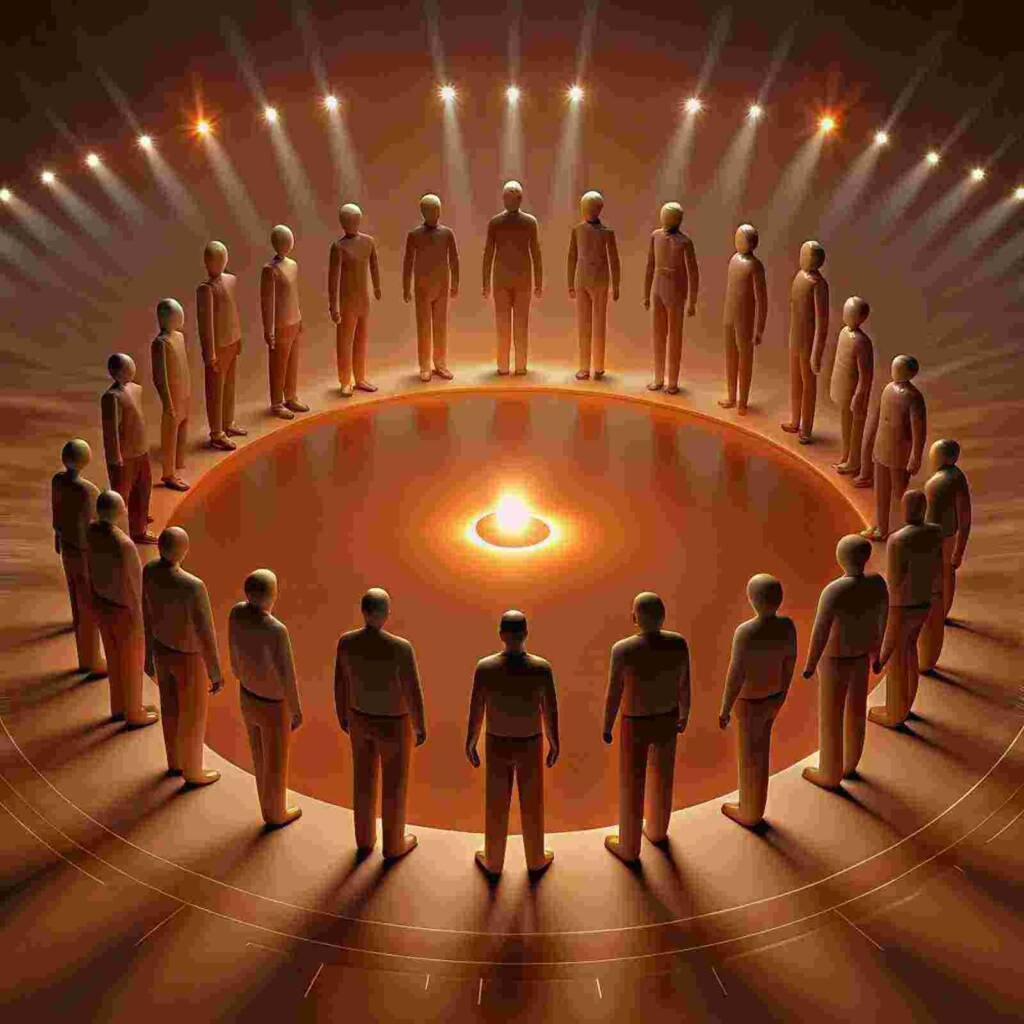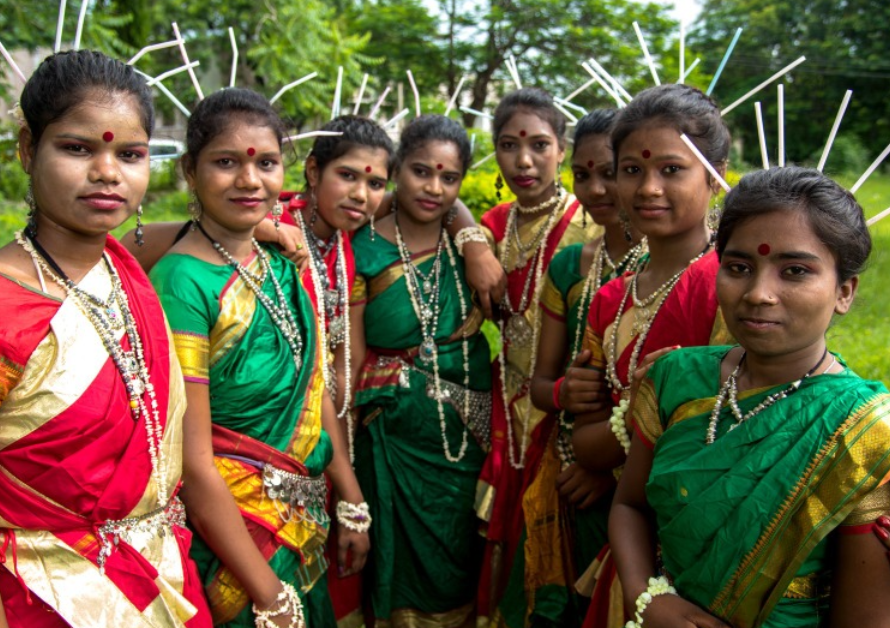Networking Through “National Hinduism Board”:
I initiated the “National Hinduism Board” WhatsApp group to connect with like-minded individuals who are passionate about safeguarding Hindu interests and promoting a nationalist agenda. However, after 15 days, we only have around 150 members, and the growth has been slow. Unfortunately, many of the members seem content with forwarding messages and reacting to chats rather than actively contributing to the cause. Despite my calls for help, very few have stepped forward. Only three individuals have reached out to appreciate the effort, but none have provided any tangible support to drive the movement forward. It’s unclear how many members are even reading the messages, which makes it hard to gauge the impact we are making.
Disconnection Among Groups:
One of the biggest challenges we face is that there are many small groups with similar goals, but they operate in isolation. Without interconnectivity, our efforts remain fragmented and ineffective. I’ve identified around 20 individuals on social media who share similar objectives, but my attempts to connect with them through available contact information have yielded no response. I’m unsure if the contact details are outdated or incorrect, but this lack of coordination is hindering collective progress.
Influential Figures Working in Silos:
There are several influential figures like Prashant Kishor, Kumar Vishwas, Mukesh Khanna, Ashwini Upadhyay, Arnab Goswami, Pushpendra Kulshrestha, Sudhanshu Trivedi, Madhavi Lata, Sushant Sinha, Pawan Kalyan, Vishnu Shankar Jain, and Darpan Kumar Mishra, who are making commendable efforts individually. However, they too seem to be working in isolation. I haven’t seen any attempts to unite on a common platform to form something like a National Hindutva Board, which could have the same influence as powerful organizations like the Waqf Board and Christian Mission Boards. These boards, which are among the richest entities in the country, may soon surpass even corporations like the TATAs and Ambanis in influence.
Lack of Support from Spiritual Leaders:
I’ve also attempted to engage with spiritual leaders and preachers in Vrindavan, but most of them have not responded except one. They all seem to be preoccupied with increasing their follower base and running their own organizations. While they often speak about larger goals and issues, very few take meaningful action. Many of them are simply blaming Modi and the BJP for not doing enough for Hindus, but without contributing any substantial efforts themselves.
Need for a Strong, Unified Organization:
What we truly need is a well-organized, widespread network of people committed to our cause. I have several ideas and strategies, but lack the necessary political and social connections to turn these ideas into action. A unified front is essential to make a difference, and we need dedicated individuals willing to support our movement and bring about real change.
Realization of BJP’s Efforts:
Although I’m not politically inclined, I’ve come to realize that the NDA/BJP, under the leadership of Prime Minister Narendra Modi, has worked tirelessly over the past decade to protect India’s national interests, Hinduism, and cultural heritage. His team, including Amit Shah, Ajit Doval, and Yogi Adityanath, have made significant strides in safeguarding our nation’s integrity. We need to acknowledge and support these efforts.
Opposition’s Threat to National Interests:
No other political party appears to care about the nation’s interests. Instead, they seem to have united in a concentrated effort to destabilize Modi’s government, even if it means jeopardizing the country’s security and selling out to global superpowers. These parties are working hand in hand with anti-nationalist and anti-Hindu groups to incite civil unrest and disrupt the growth of India’s economy and geopolitical standing. Their goal is to oust the Modi government and install a puppet regime, as they have recently done in Bangladesh, where Mohammad Yunus, who had no significant political background, has been positioned in power after creating civil unrest and toppling the previous government. A similar strategy is being used against India, and it’s something all nationalists and Hindus must be aware of.
Opposition’s Growing Aggression:
The opposition has been emboldened by their political gains in recent elections, and the rise of anti-national and anti-Hindu elements is evident. These groups can now mobilize thousands of people at a moment’s notice, causing significant disruptions in major cities like Mumbai and Delhi. This is an alarming situation that needs immediate attention.
Divided Pro-Nationalist and Pro-Hindu Votes:
While our opposition is growing stronger, our own community remains divided. Half of our supporters don’t vote, and the rest are split between 2-3 candidates. This division of votes is one of the main reasons for the opposition’s success. If we don’t unify, the future of Hindus in India is in jeopardy, and we risk becoming a minority in an Islamic nation ruled by Sharia law.
The Need to Unite Behind Modi:
Our only hope is to unite strongly behind Modi and his government, which has proven to be the only force capable of protecting Hindus and maintaining India’s integrity as a democratic nation. We must fully support Modi in upcoming state elections to oust opposition-ruled states. Modi has done his best, but the limited mandate we’ve given him has restricted his ability to accelerate the country’s progress. It is up to us to strengthen his wings and ensure he has the full support necessary to continue leading India on the path of growth and protection of our national and religious interests.What I Am Trying to Achieve Through This Group and What Pro-Nationalists and Pro-Hindus Should Do in the Current Scenario
Networking Through “National Hinduism Board”:
I initiated the “National Hinduism Board” WhatsApp group to connect with like-minded individuals who are passionate about safeguarding Hindu interests and promoting a nationalist agenda. However, after 15 days, we only have around 150 members, and the growth has been slow. Unfortunately, many of the members seem content with forwarding messages and reacting to chats rather than actively contributing to the cause. Despite my calls for help, very few have stepped forward. Only three individuals have reached out to appreciate the effort, but none have provided any tangible support to drive the movement forward. It’s unclear how many members are even reading the messages, which makes it hard to gauge the impact we are making.
Disconnection Among Groups:
One of the biggest challenges we face is that there are many small groups with similar goals, but they operate in isolation. Without interconnectivity, our efforts remain fragmented and ineffective. I’ve identified around 20 individuals on social media who share similar objectives, but my attempts to connect with them through available contact information have yielded no response. I’m unsure if the contact details are outdated or incorrect, but this lack of coordination is hindering collective progress.
Influential Figures Working in Silos:
There are several influential figures like Prashant Kishor, Kumar Vishwas, Mukesh Khanna, Ashwini Upadhyay, Arnab Goswami, Pushpendra Kulshrestha, Sudhanshu Trivedi, Madhavi Lata, Sushant Sinha, Pawan Kalyan, Vishnu Shankar Jain, and Darpan Kumar Mishra, who are making commendable efforts individually. However, they too seem to be working in isolation. I haven’t seen any attempts to unite on a common platform to form something like a National Hindutva Board, which could have the same influence as powerful organizations like the Waqf Board and Christian Mission Boards. These boards, which are among the richest entities in the country, may soon surpass even corporations like the TATAs and Ambanis in influence.
Lack of Support from Spiritual Leaders:
I’ve also attempted to engage with spiritual leaders and preachers in Vrindavan, but most of them have not responded except one. They all seem to be preoccupied with increasing their follower base and running their own organizations. While they often speak about larger goals and issues, very few take meaningful action. Many of them are simply blaming Modi and the BJP for not doing enough for Hindus, but without contributing any substantial efforts themselves.
Need for a Strong, Unified Organization:
What we truly need is a well-organized, widespread network of people committed to our cause. I have several ideas and strategies, but lack the necessary political and social connections to turn these ideas into action. A unified front is essential to make a difference, and we need dedicated individuals willing to support our movement and bring about real change.
Realization of BJP’s Efforts:
Although I’m not politically inclined, I’ve come to realize that the NDA/BJP, under the leadership of Prime Minister Narendra Modi, has worked tirelessly over the past decade to protect India’s national interests, Hinduism, and cultural heritage. His team, including Amit Shah, Ajit Doval, and Yogi Adityanath, have made significant strides in safeguarding our nation’s integrity. We need to acknowledge and support these efforts.
Opposition’s Threat to National Interests:
No other political party appears to care about the nation’s interests. Instead, they seem to have united in a concentrated effort to destabilize Modi’s government, even if it means jeopardizing the country’s security and selling out to global superpowers. These parties are working hand in hand with anti-nationalist and anti-Hindu groups to incite civil unrest and disrupt the growth of India’s economy and geopolitical standing. Their goal is to oust the Modi government and install a puppet regime, as they have recently done in Bangladesh, where Mohammad Yunus, who had no significant political background, has been positioned in power after creating civil unrest and toppling the previous government. A similar strategy is being used against India, and it’s something all nationalists and Hindus must be aware of.
Opposition’s Growing Aggression:
The opposition has been emboldened by their political gains in recent elections, and the rise of anti-national and anti-Hindu elements is evident. These groups can now mobilize thousands of people at a moment’s notice, causing significant disruptions in major cities like Mumbai and Delhi. This is an alarming situation that needs immediate attention.
Divided Pro-Nationalist and Pro-Hindu Votes:
While our opposition is growing stronger, our own community remains divided. Half of our supporters don’t vote, and the rest are split between 2-3 candidates. This division of votes is one of the main reasons for the opposition’s success. If we don’t unify, the future of Hindus in India is in jeopardy, and we risk becoming a minority in an Islamic nation ruled by Sharia law.
The Need to Unite Behind Modi:
Our only hope is to unite strongly behind Modi and his government, which has proven to be the only force capable of protecting Hindus and maintaining India’s integrity as a democratic nation. We must fully support Modi in upcoming state elections to oust opposition-ruled states. Modi has done his best, but the limited mandate we’ve given him has restricted his ability to accelerate the country’s progress. It is up to us to strengthen his wings and ensure he has the full support necessary to continue leading India on the path of growth and protection of our national and religious interests.
How should we proceed further to achieve our objectives
Unifying efforts for a common cause, particularly around pro-nationalist and pro-Hindu objectives, requires a well-structured approach. Here’s how you can work towards achieving unity and creating a more coordinated movement:
Establish a Clear Vision and Objectives
Define the Purpose: Make sure the goals of your movement are clearly articulated and shared across all platforms. A clear, concise mission statement helps align everyone’s efforts. For example, “Safeguarding Hinduism and India’s cultural heritage while promoting national unity and integrity.”
Set Measurable Goals: Break down the larger goal into smaller, actionable steps. For instance, organizing events, advocacy campaigns, or media outreach focused on protecting Hindu interests or highlighting nationalistic causes.
Create a Centralized Platform
Develop a Website or App: Rather than relying solely on WhatsApp or other fragmented social media groups, build a central online platform where members can interact, access resources, share updates, and discuss strategies. This could serve as a virtual hub where smaller groups can converge.
Coordination Through Committees: Establish sub-groups or committees focused on specific tasks, such as political advocacy, media outreach, event organization, or educational campaigns. These committees can report to a core leadership team that coordinates efforts.
Reach Out to Influential Figures Again
Persistent Outreach: Reconnect with the influential figures you mentioned (e.g., Prashant Kishor, Kumar Vishwas, Mukesh Khanna, etc.) and spiritual leaders by offering concrete plans for collaboration. Use email, social media, and direct meetings to explain the unified approach and how their involvement could strengthen the movement.
Highlight Mutual Benefits: Explain how unity can multiply their individual efforts by amplifying their voice, reaching larger audiences, and achieving broader political and social objectives.
Host a National Conference
Organize a Conference or Webinar: Invite influential figures, spiritual leaders, and grassroots activists for a national dialogue on Hindu unity and national interests. A conference or online webinar can be a starting point to bring various stakeholders together, discuss strategies, and foster collaboration.
Publicize the Event: Use social media campaigns, YouTube, and digital marketing to create buzz around the event and encourage widespread participation.
Build Partnerships
Partner with Existing Organizations: Seek partnerships with established Hindu organizations, nationalist groups, and think tanks. Groups such as VHP (Vishva Hindu Parishad), RSS (Rashtriya Swayamsevak Sangh), and others may already have the resources and networks you need.
International Hindu Organizations: Engage with global Hindu organizations like the Hindu American Foundation (HAF) and Hindu Council of UK to form a wider network of support and outreach.
Strengthen Online Presence
Social Media Campaigns: Launch coordinated social media campaigns across platforms like Twitter, Facebook, and Instagram to spread awareness about the movement. These campaigns should focus on educating people about the key issues and rallying them toward unified action.
Create Engaging Content: Develop videos, infographics, and articles that promote Hindu unity, highlight key challenges, and present solutions. The more engaging and informative your content, the more likely it is to gain traction.
Develop a Grassroots Network
Local Chapters: Form local chapters of your organization across different regions. Each chapter can work on a localized version of the larger agenda, organizing events, meetings, and outreach efforts within their community.
Appoint Regional Leaders: Appoint trustworthy and dedicated regional leaders who can help coordinate efforts at the local level and report back to the central leadership team.
Foster Unity with Common Themes
Promote Shared Cultural Values: Unite people around cultural events, festivals, and common Hindu practices. Organizing events such as mass pujas, Rath Yatras, or cultural showcases will help bring people together in a non-political setting, fostering a sense of community.
Build Educational Programs: Host lectures or workshops on topics such as Hindu philosophy, history, and national integration. Educating the public, especially the youth, can instill pride and a sense of responsibility towards the cause.
Use Media to Amplify the Cause
Engage with Mainstream Media: Reach out to journalists, TV anchors, and media outlets to feature stories about the movement’s work. Engage with media figures like Arnab Goswami, Sudhanshu Trivedi, or Sushant Sinha to help spread the message to a broader audience.
Launch Your Own Media Initiatives: If traditional media doesn’t support the cause, launch a podcast, YouTube channel, or blog where you can discuss Hindu nationalist issues and engage with followers directly.
Coordinate Political Support
Support the BJP and Other Nationalist Allies: Although your movement is not politically driven, it’s important to align with political forces that share your goals. Mobilize support for the BJP in upcoming elections by rallying your network and ensuring votes are not divided.
Engage in Advocacy: Advocate for pro-Hindu policies and protections by drafting petitions, writing to legislators, or holding public forums. Build a unified demand for creating a National Hindutva Board or similar body with powers comparable to the Waqf Board.
Financial Support and Resource Mobilization
Crowdfunding and Donations: Use crowdfunding platforms to raise funds for events, campaigns, and outreach. Financial independence will help your movement grow without reliance on external entities.
Volunteer Mobilization: Encourage members to contribute their time and skills. Set up volunteer drives to help with event planning, social media outreach, and grassroots networking.
Engage Youth and New Generations
Youth Programs: Develop programs aimed at younger generations to get them engaged. Youth are more likely to resonate with modern platforms like Instagram, YouTube, and short video content. Empowering youth leaders can inject energy and creativity into the movement.
Mentorship Programs: Create mentorship opportunities where younger members are paired with experienced leaders to foster leadership development and long-term commitment.
Create a Unified Symbol or Slogan
Adopt a Common Symbol or Slogan: Movements are often strengthened by rallying behind common symbols or slogans that everyone can identify with. Create a powerful, resonant slogan or symbol that represents unity and the cause of Hindu nationalism, which can be used across all platforms, events, and campaigns.
Conclusion
Building unity among pro-nationalist and pro-Hindu groups is no small task, but with a clear vision, strong leadership, and coordinated efforts, it is achievable. By leveraging modern communication tools, engaging with influential figures, and building a strong grassroots network, you can create a powerful and unified movement that can truly make an impact on the national stage. Unity is strength, and this strength is essential to ensure the protection and growth of Hinduism and India’s national interests.







